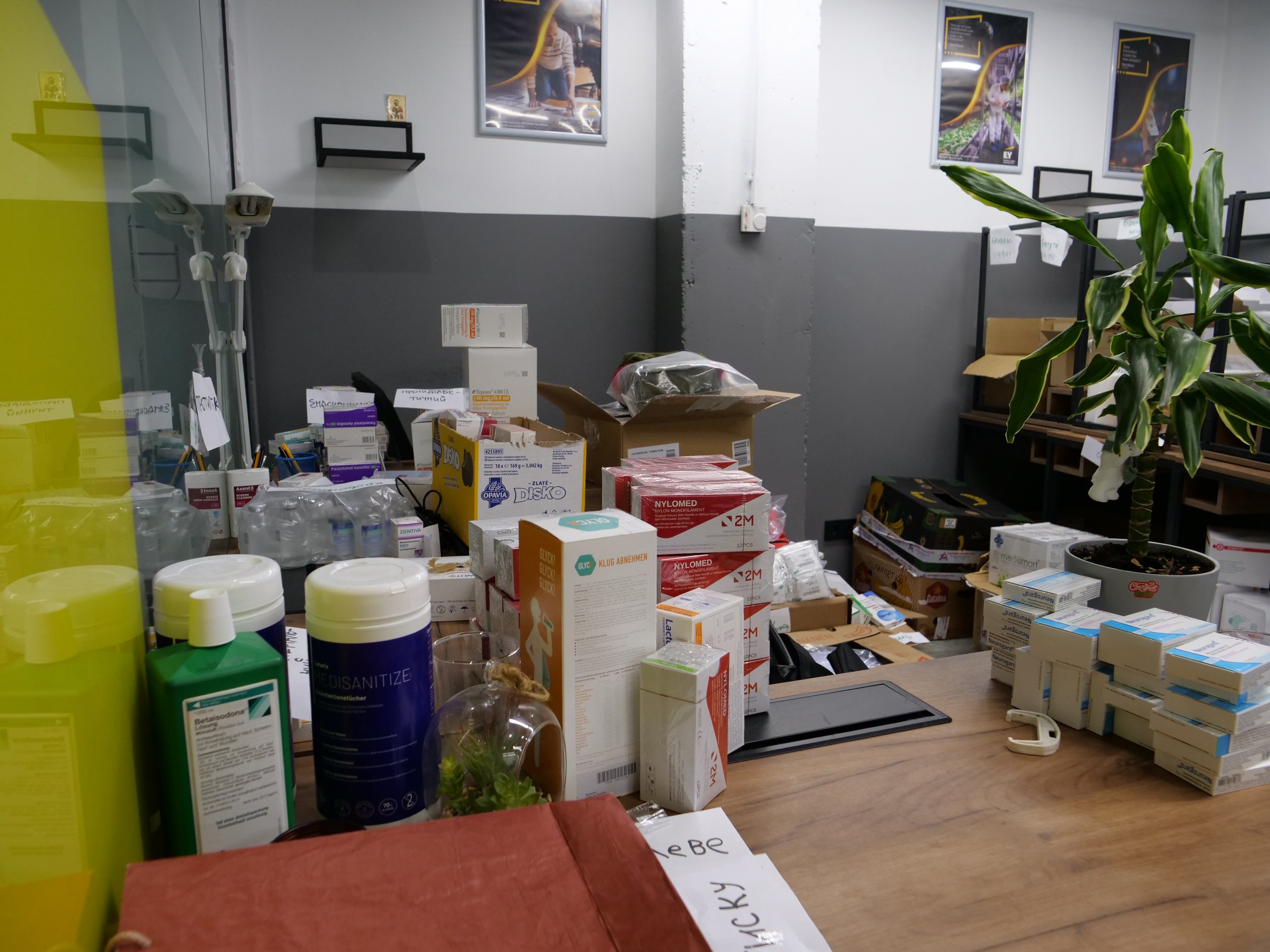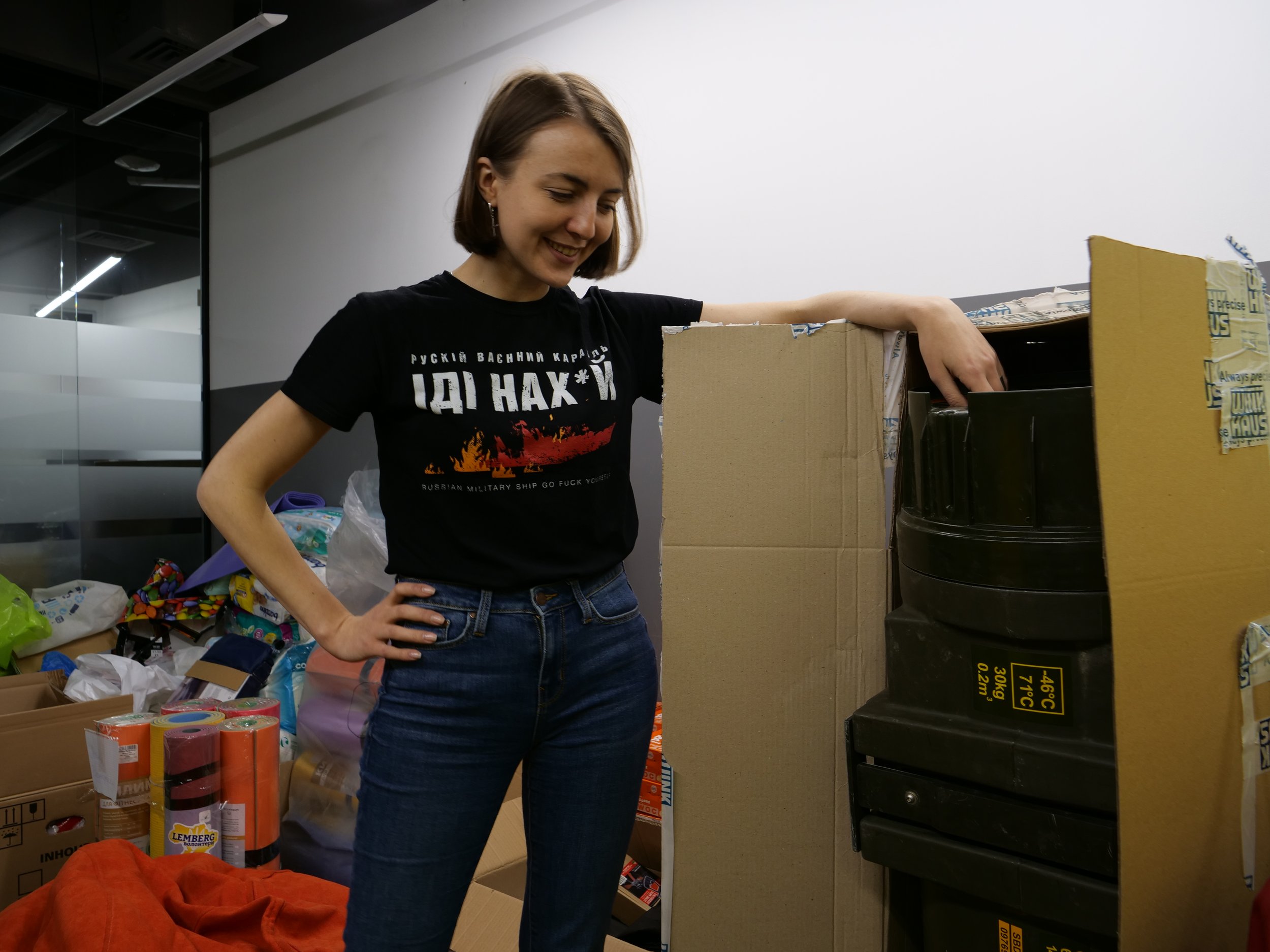Defence network takes shape
FINDING A SENSE OF PURPOSE AMID CHAOS, UKRAINIANS AT HOME AND ABROAD ARE FINDING WAYS TO RAISE FUNDS AND SECURE SUPPLIES FOR RESISTANCE EFFORT
July 9, 2022 — WINNIPEG FREE PRESS
LVIV — Svitlana Nahorna arrives most days at her office at the crack of dawn and leaves long after the sun has set.
She works in one of those overly modern office spaces, with fancy coffee machines and an open-concept restaurant on the ground floor, and a room where employees can come and chill on communal benches during breaks.
Nahorna pours an evening coffee as her phone lights up and blares that now-familiar sound of an air-raid siren. Her interview with the Free Press will have to be done from the bomb shelter.
"When we had the last rocket attack — or even maybe not the last, but the one before the last – I was here with two co-workers and they decided that they would leave during this alarm. And then, they ended up seeing the rocket with their own eyes," Nahorna said as she settled into the brick-walled room.
Nahorna, 30, works as an auditor for a big multinational corporation. She never imagined being the president of a charity that she started with a ragtag group of co-workers, but when war struck she knew she had no choice in the matter. They founded a group called Lemberg Volunteers that has been raising funds locally and internationally to help supply the frontline military units with non-lethal items they need — night vision gear, food, body armour, medical kits, and so on.
In the early days of war, it became clear that established aid organizations were unprepared to meet the immediate needs of the Ukrainian population as millions of people fled the country and thousands of soldiers prepared to fight. A larger network would be needed if resistance was to be successful, Nahorna said.
"The first day of the war, everyone was shocked. We just had our call with my team — it’s about 20 people," she said, as more of her co-workers filed into the shelter. "And we just started sharing our, let’s say, emotions, I guess. Our fear. We did not understand what to do. Should we work? Should we continue our normal job? Because we have our projects, we have deadlines. But we realized that something had changed. You can’t focus on anything."
And thus they decided that spare office space would be converted in storage rooms for the goods they started collecting and sending to the front. They put the call out to friends and family acquaintances for donations and they started coming in quickly. The joint venture gave them all a sense of purpose in the midst of the chaos. Since the war began, the group of a dozen co-workers has fundraised the equivalent of $384,510.
A world away, in Winnipeg, Zoya Kostetsky, 23, was feeling the same gripping anxiety, despite being physically safe in Canada. She was born in Ukraine and lived in Lviv until she was six years old when her parents relocated her to Winnipeg. But the connection runs deep even though the years have passed; Kostetsky still has family in Ukraine and even in Winnipeg she’s just beginning her career as a Ukrainian teacher at R. F. Morrison School.
But like Nahorna, Kostetsky knew she couldn’t sit idly in her anxiety. She took to her Instagram page. She’s a jewelry maker, under the handle Prairie Clay, and in February as the Russian invasion spread across the country, she switched her posts out from chic earrings, to posts about the death and destruction occurring in her home country.
"The response was just absolutely unbelievable in the best way. And so my account has kind of shifted into a fundraiser/volunteer page now," Kostetsky explained.
Overwhelming numbers of people were hungry for answers about how they could help, and Kostetsky offered a conduit for shepherding funds to small groups on the ground who could deliver aid immediately where it was needed.
"I’ve found so many different groups. We did a big medical order, we bought a bunch of stuff in Italy, a hospital there was willing to send a bunch of supplies directly to Ukraine. So we sent them money. One of my former students in Ukraine was collecting money for bulletproof vests. So I sent her money. She bought the bulletproof vests, and sent me pictures of them and everything," Kostetsky said.
"And there’s an organization, a Ukraine-wide organization, and they have been housing a lot of refugees, especially children, and so we sent them money. They’re spending it mostly on food and other necessities. I know they bought a stroller the other day for a mom, so yeah, just really, really necessary things that people are needing right now."
And that’s how Kostetsky came across Nahorna’s work with Lemberg Volunteers. Through a friend of a friend, Kostetsky and Nahorna connected on Instagram and money donated in Canada quickly was being put to use by Lemberg Volunteers to purchase equipment going directly to the frontline. Both women operate as transparently as possible and post photos of the individuals receiving the aid in whatever form it comes. And this method of direct impact has paid off. Kostetsky has been able to raise more than $66,000 from her home in Winnipeg, with approximately $13,000 of that going to the Lemberg Volunteers alone.
The World Bank estimates that remittances from foreign nations to Ukraine will increase by 20 per cent in 2022 because of the escalated war, which means tens of billions of dollars will flow from unofficial sources like Kostetsky from her home in Winnipeg.
But Canadians are not alone in sending funds into Ukraine to help bolster the war effort. In Warsaw, Poland, on the steps of the science and culture building, a troupe of teenagers sing Ukrainian folk songs with an open case in front of them. They say they’re sending the funds directly to the Ukrainian military.
In the shade of a tree in Warsaw’s old city, Maria Tokar, 21, sits and folds craft paper around blue and gold chocolates. She twists and crinkles the paper until she’s created a whole bouquet of chocolate-centred tulips she then sells to raise money for various charities operating in Ukraine.
Tokar fled from the eastern Ukrainian city of Dnipro as fighting dragged on in the neighbouring provinces. For her, she explains, leaving for Poland wasn’t about her own safety as much as it was about feeling powerless to help from within the country. But from Poland, she knew she could do more. She could work, she could volunteer, she could send money home.
"And it’s also an important thing that when people return to Ukraine, many cities are in ruins. So it’s economic troubles that will keep people from earning money. In Poland, I am able to work to make money for myself and I can also fundraise for help," Tokar said.
As the air raid siren ends in Lviv just over an hour later, Nahorna returns to her office to show off the equipment and goods that will be sent out in the coming days and weeks. Food and diapers for humanitarian aid, but most of the stuff is destined for the military.
Then she smiles, and she hauls out a big cardboard box.
"Some of the soldiers are so grateful that they want to send me gifts," she said. As she opens the flaps she reveals the shell of a four-foot tall munitions casing.
"I think I will turn it into a flower bed," Nahorna said with a laugh.
The long days are exhausting, she has essentially been working two full-time jobs for months on end. It’s been difficult to watch other people go on with their lives as if the war isn’t still going on, she says. But at the same time, she has had to start taking some time for normal things in her own life in order to keep going.
"For a long time I couldn’t go and get a manicure," Nahorna said. "But then I realized, Russians will still keep killing Ukrainians whether my nails look bad or not. So I started taking that time. I started going back to coffee shops."
But even in those rare moments that she allows herself to enjoy the regular parts of life, Nahorna is thinking long and hard about how it is she is still free to do those things, and the soldiers to whom she will always feel indebted.
"You realize that you do not have an option but to help them. Because if they are ready to give their lives for my safety here, for me to have an opportunity to drink coffee in this café, then which options do I have? I do not have them."





